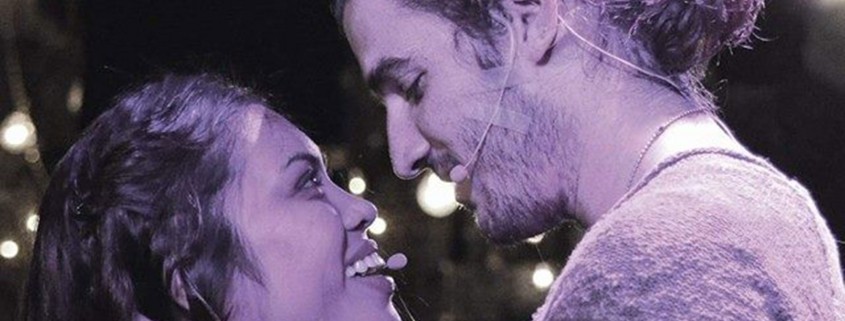Rockwell show puts fun spin on Shakespeare classic
Shakespeare was a genius — there’s no denying that. His plays are still performed and celebrated now, 399 years after his death. His impact on the English language was massive.
For some, his 17th century English, however, can be a big hurdle to overcome. For others, the English isn’t so challenging, but there are only so many times one can enjoy Othello before moving on to other works. It is for these reasons that modern twists on Shakespearean tales will always be welcome, if done right. Romeo & Juliet: Love is a Battlefield, a new performance at the Rockwell Table & Stage in Loz Feliz, is done very well. Blending the Bard’s classic story of woe with a slate of crackling Pat Benatar anthems, the show is far from boring and puts a fun twist on the story.
The plot remains unchanged from Shakespeare’s 1597 quarto. Montagues and Capulets are feuding, Romeo and Juliet develop the mother of all forbidden loves and tragedy ensues. The story has been moved from Verona to Palestona. As an attempt at modernization, the story is inserted into the Israeli-Palestinian conflict. But that is almost a red herring. If it weren’t for all the times they say “Palestona” and the corresponding Star of David and crescent moon tattoos for the now-Israeli Montagues and the Palestinian Capulets, one would not notice the difference. Where this show excels is the insertion of gushy ’80s anthems.
Songs like “Heartbreaker” and “Hit Me With Your Best Shot” were not megahits for their lyrical nuance. They’re large-scale and loud and unabashedly corny. “Heartache to heartache we stand/ no promises/ no demands/ love is a battlefield” isn’t exactly Dylanesque in terms of subtlety, but it sure is fun to belt out at the top of one’s voice.
Normally this would not jive well with one of the classic stories of the English language. But here is Shakespeare’s dirty little secret: while the way he used his words were so revolutionary they changed the English language, his actual stories are not that complex. When his star-crossed lovers fall for each other, they fall for each other immediately and completely. There’s no courtship or emotional buildup. They suffer the strongest ever case of love at first sight and are immediately infatuated with each other. And when things go wrong, complete anguish consumes the lovers. Shakespeare doesn’t mess around with shades of grey; only the biggest, brashest emotions were in his palette. So, actually, Pat Benatar songs pair extremely well with the material.
Right after Romeo falls for his Juliet, they meet up and sing “Heartbreaker.” Neither actor holds back. “Your love is like a tidal wave/ spinning over my head,” it’s blunt, but it also pretty much captures the emotions floating around the two heads of the smitten Palestonans. As alluded to before, they’re immediately maxed out in terms of being in love. There are worse ways to express this than gleefully belting out lyrics about their soul being set on fire, burning out of control.
Plus, its helps when the actors are really good at it. Juliet is played by Ashley Argota, who puts on a lovely performance. She has the voice to carry Benatar’s passionate, soaring vocals but also provides an alluring charm to her character. She has appeared on The Fosters on ABC Family and was young Nala in the national tour of The Lion King. She’s impressive and the spotlight suits her. Compared to her, Rustin Cole Sailors’ Romeo is a bit overshadowed. He puts on a fine performance, but everyone on the cast does a great job. Nicci Claspell, who plays a much younger nurse character than what one is familiar with in past renditions of the play, knocks a performance of Tina Turner’s “What’s Love Got To Do With It,” out of the park. Jameson Moss plays the friar — he was last seen as one of Emma Stone’s fake conquests on Easy A — and also puts his great voice on display. So, despite Sailors’ adequate performance of Romeo, he fails to separate himself from the crowd, as Argota does.
The show itself is unique. The Rockwell Table & Stage is more cabaret than theater, as all the guests are seated at tables and eat and drink as the show goes on around them. Romeo climbs up on the back of chairs; Juliet sings from both side walls. There isn’t much in terms of set, but that is made up for by the immersive experience that is brought by the singers moving about all around the room.
Logistically, that movement does bring about the biggest drawback of the show. There are six columns in the middle of the room and as the performance moves around the room it is not uncommon to be obstructed by the very structure of the room. Some of the seats are sold as “partial view seating,” but it is difficult to imagine any of the seats offering an unobstructed view of the show throughout the entire performance. It is a small shame but overall, does not overshadow the very strong entertainment value of one of Shakespeare’s most beloved stories with the bombastic anthems to match it in spirit.

